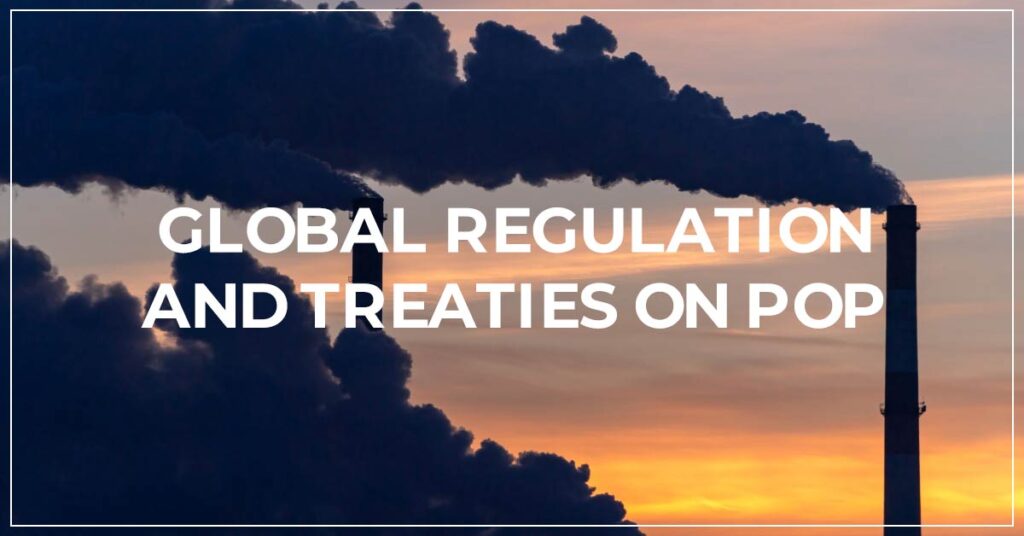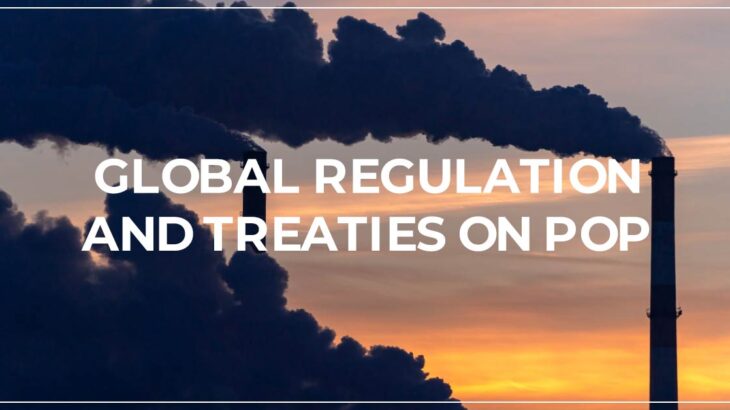
Persistent Organic Pollutants (POPs) are a global concern due to their ability to travel long distances through air and water currents, impacting ecosystems and human health worldwide. Number of international accords and regulatory structures has been put in place to address this problem, limiting and reducing POP production, use, and release. By encouraging the phase-out of these hazardous substances and putting policies in place for their management and disposal, these agreements seek to safeguard both the environment and human health.
The Stockholm Convention on Persistent Organic Pollutants, which was adopted in 2001 and went into effect in 2004, is one of the important international agreements addressing POPs. A total of 29 POPs are the focus of the Stockholm Convention; these include industrial chemicals like dioxins and PCBs as well as insecticides like DDT. Parties to the Convention are required to take action to minimize the release of POPs into the environment and to stop or restrict the manufacture and use of those substances. Additionally, it supports the development of environmentally friendly POP-containing waste disposal techniques as well as alternatives to POPs.
Another significant global initiative is the Basel Convention on the Control of Transboundary Movements of Hazardous Wastes and their Disposal, adopted in 1989 and entered into force in 1992. This deals with the environmentally responsible handling of hazardous wastes, which includes wastes containing POPs. The Basel Convention aims to assure the environmentally sound disposal of hazardous wastes, minimize their creation, and regulate their transboundary movements. Additionally, it encourages international collaboration and technical support to assist nations in developing the capacity to efficiently manage hazardous wastes.
Furthermore, the Rotterdam Convention adopted in 1998 and entered into force in 2004. Promoting shared responsibility in the worldwide trade of hazardous chemicals, including some POPs, is the goal of the Rotterdam Convention on the Prior Informed Consent (PIC) Procedure for Certain Hazardous Chemicals and Pesticides in worldwide Trade. Prior informed permission from importing nations is a requirement of the Rotterdam Convention for exporting nations transporting certain hazardous substances included in Annex III. This system promotes the sharing of information regarding the hazards and safe handling of potentially hazardous substances, enabling governments to make well-informed decisions about their importation.
And United Nations Economic Commission for Europe (UNECE) POPs Protocol, adopted in 1998 and entered into force in 2003, aims to control and reduce emissions of POPs within the UNECE region. The agreement establishes emission reduction targets for particular POPs, such as furans, dioxins, and PCBs. By taking steps like creating plans to reduce emissions, using the best methods available, and switching to safer substitutes. In order to track progress toward reaching these goals and guarantee member state compliance, it also contains measures for reporting, monitoring, and evaluation processes. The UNECE POPs Protocol aims to shield the environment and public health from the damaging effects of persistent organic pollutants.
Additionally, regional agreements and initiatives play a crucial role in addressing POPs pollution. For example, In compliance with the Stockholm Convention, the European Union (EU) has enacted rules, such as the EU Regulation on Persistent Organic Pollutants(EU) 2019/1021, adopted on June 20, 2019, which imposes rigorous limitations on the manufacture, use, and release of POPs inside its member states. In order to assure compliance and evaluate the progress made toward lowering POPs levels and protecting both human health and the environment, the law also encourages the introduction of safer substitutes and cleaner manufacturing methods. It places a strong emphasis on monitoring, reporting, and review.
Effective POPs pollution regulation and management remain a challenge despite these global and regional initiatives. These obstacles include the requirement for developing nations to increase their capacity and provide technical support, the need to ensure that regulations are followed and enforced, the need to address new and emerging POPs, and the promotion of POP alternatives in a variety of industrial sectors.
To sum up, international treaties and regulations pertaining to Persistent Organic Pollutants (POPs) are significant milestones in the right direction toward solving this problem for the environment and human health. Through the implementation of measures to minimize POPs pollution, information sharing and best practices, and international cooperation, these accords help to protect ecosystems and human health globally. Collaboration and ongoing efforts are necessary to successfully address the problems caused by POPs and create a toxic-free future. Talk to a consultant at Sunstream to understand more about POP regulations and your obligations. Sunstream supports a wide range of impactful global regulations like REACH Compliance, RoHS compliance and Prop 65.




 +1.585.935.7123
+1.585.935.7123 +91-804-148-6861
+91-804-148-6861